Publications
Books
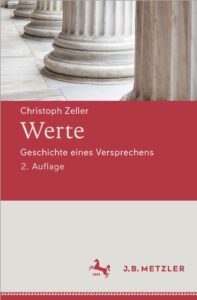 Werte. Geschichte eines Versprechens (Values. History of a Promise), Stuttgart: J.B. Metzler 2019; 2nd, revised and expanded edition, Heidelberg: J.B. Metzler, 2022.
Werte. Geschichte eines Versprechens (Values. History of a Promise), Stuttgart: J.B. Metzler 2019; 2nd, revised and expanded edition, Heidelberg: J.B. Metzler, 2022.
Values: History of a Promise shows what values are, why they exist, how we talk about them and why they have different meanings in discrete areas of society. This volume offers a cultural-historical overview and traces various ideas of values back to general characteristics. It uses approaches from culture and media theory to emphasize similarities in value conceptions without neglecting their inner contradictions. Each chapter is dedicated to a specific field of knowledge in which values are of importance such as philosophy, politics, religion, economics, psychology, literature, information technology, and the life sciences. – For the second edition, the volume has been expanded, consistently updated, and a chapter on the art market has been added.
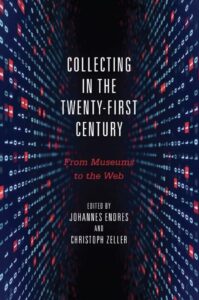 Collecting in the Twenty-First Century: From Museums to the Web, ed. Johannes Endres and Christoph Zeller, Rochester and New York: Camden House, 2022.
Collecting in the Twenty-First Century: From Museums to the Web, ed. Johannes Endres and Christoph Zeller, Rochester and New York: Camden House, 2022.
Seminal to the rise of human cultures, the practice of collecting is an expression of individual and societal self-understanding. Through collections, cultures learn and grow. The introduction of digital technology has accelerated this process and at the same time, changed, how, what and why we collect. Collecting in the Twenty-First Century identifies the impact of technology, both new and old, on the cultural practice of collecting as well as the challenges and opportunities of collecting in the digital era. Scholars from German Studies, Media Studies, Museum Studies, Sound Studies, Information Technology, and Art History as well as librarians and preservationists offer insights into the most recent developments in collecting practices
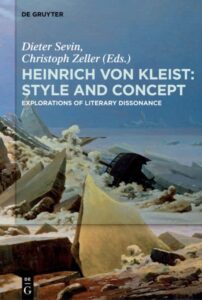 Heinrich von Kleist: Style and Concept – Explorations in Literary Dissonance, ed. Dieter Sevin and Christoph Zeller, Berlin and Boston: de Gruyter, 2013.
Heinrich von Kleist: Style and Concept – Explorations in Literary Dissonance, ed. Dieter Sevin and Christoph Zeller, Berlin and Boston: de Gruyter, 2013.
The impact of Heinrich von Kleist unfolds between precise depictions and moral extremes. Crystallized in words, his characters appear as paradigms of human fallibility. Their passions and obsessions, their inadequacies and longings are captured in a writing style that reveals its influence even in novels and plays of the twentieth and twenty-first centuries. This volume takes the literary reception of Kleist as one of its focal points and considers the author’s oeuvre and his life on the occasion of the 200th anniversary of his death.
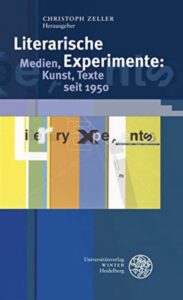 Literarische Experimente: Medien, Kunst, Texte seit 1950 [Literary Experiments: Media, Art, Texts since 1950], ed. Christoph Zeller, Heidelberg: Winter, 2012.
Literarische Experimente: Medien, Kunst, Texte seit 1950 [Literary Experiments: Media, Art, Texts since 1950], ed. Christoph Zeller, Heidelberg: Winter, 2012.
Experiments in literature and art signal a social upheaval. They contrast the presumably political certainties with the uncertain outcome of aesthetic representation. In aesthetic experiments meanings dissolve as soon as grammatical patterns and semantic conventions turn into variables on the playing field of aesthetic creativity. Coincidence and openness have shaped aesthetic production in particular since the 1950s. Under the influence of the historical avant-garde movements of the early twentieth century, literature reflects on its linguistic material and its media nature. Such literature emphasizes the visual, performative, and musical qualities of words and sounds. As the essays in this volume show, literary experiments expand the boundaries of the poetic and open up new dimensions of aesthetic experience.
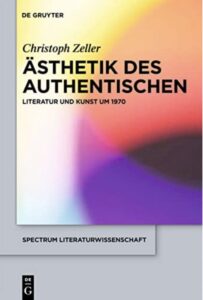 Ästhetik des Authentischen: Literatur und Kunst um 1970 [Aesthetics of Authenticity: Literature and Art around 1970], Berlin and New York: de Gruyter, 2010.
Ästhetik des Authentischen: Literatur und Kunst um 1970 [Aesthetics of Authenticity: Literature and Art around 1970], Berlin and New York: de Gruyter, 2010.
Media revolutions awaken a longing for authenticity. Literature and art respond by turning to the factual – the action, and the moment – and pose as life itself. Historical avant-garde movements, which are exemplary for many aesthetics around 1970, bear witness to this. The present study unfolds the history and theory of the authentic from Nietzsche to Adorno and shows authenticity in various artistic forms (documentary literature, performance art, autobiography, prose, collage texts) as an aesthetic effect.
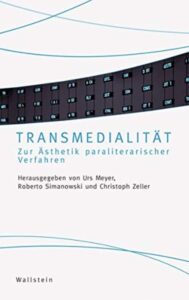 Transmedialität: Zur Ästhetik paraliterarischer Verfahren [Transmediality: On the Aesthetics of Para-Literature], eds. Urs Meyer, Roberto Simanowski and Christoph Zeller, Göttingen: Wallstein, 2006.
Transmedialität: Zur Ästhetik paraliterarischer Verfahren [Transmediality: On the Aesthetics of Para-Literature], eds. Urs Meyer, Roberto Simanowski and Christoph Zeller, Göttingen: Wallstein, 2006.
The volume provides an overview of current media-theoretical and media-historical debates that outline the concept of the transmedial. Cross-media processes of aesthetic communication have produced various new forms of artistic expression to this day. The essays in this volume discuss techniques, eras and genres of media cooperation in literature and art under the concept of transmediality. While intermediality puts the accent on the result of the completed connection of different media (e.g. literature in film), the concept of transmediality emphasizes the transition between the source and target medium (e.g. the simultaneous transformation of dance into music).
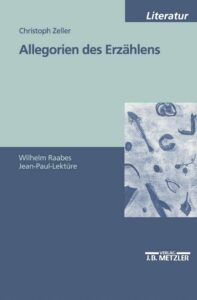 Allegorien des Erzählens: Wilhelm Raabes Jean-Paul-Lektüre [Allegories of Narrating: Wilhelm Raabe Reads Jean Paul], Stuttgart and Weimar: J.B. Metzler, 1999.
Allegorien des Erzählens: Wilhelm Raabes Jean-Paul-Lektüre [Allegories of Narrating: Wilhelm Raabe Reads Jean Paul], Stuttgart and Weimar: J.B. Metzler, 1999.
Wilhelm Raabe’s novels form an artistic network of quotations and allusions. Not the story, but the manner of presentation is the subject of his texts. Forerunner of this type of metatextual writing was Jean Paul, to whom Raabe often refers. Jean Paul’s emphasis on the fragmentary and, thus, the “ugly” stood in stark contrast to the dominating aesthetics of the Weimar Classics. With his commitment to Jean Paul, Raabe freed himself from the epoch of bourgeois realism. His novels, like those of Jean Paul, establish literary modernity.
Journal articles
- “Before the Fall: Norbert Scheuer’s Die Sprache der Vögel,” Gegenwartsliteratur, edition on “Ecocriticism/Environmental Humanities,” 19 (2020), 197–221.
- “Moment and Permanence in Wolf Vostell’s Performance Art,” Poetica 52.1/2 (2020), 170–193.
- “Primordial Poetry: Herder’s Abhandlung über den Ursprung der Sprache and the Poetics of Lying,” The Germanic Review 93.3 (2018), 250–276.
- “From Object to Information: The End of Collecting in the Digital Age,” Arcadia 50.2 (2015), 389–409.
- “Vostell und die experimentelle Literatur” [Vostell and Literary Experiments], Fluxus und/als Literatur: Zum Werk Jürgen Beckers, text + kritik, Sonderband, Neoavantgarden, vol. 3, ed. Anne-Rose Meyer-Eisenhut und Burkhard Meyer-Sickendiek, Munich: edition text + kritik, 2014, 15–34.
- “Veltens Erbe: Geld und Geist in Raabes Die Akten des Vogelsangs” [Velten’s Legacy: Money and Spirit in Raabe’s Die Akten des Vogelsangs], Jahrbuch der Raabe-Gesellschaft 2013, 95–125.
- “‘Annäherung an die Unsterblichkeit’: Ökonomie und Religion in Hermann Brochs Die Schlafwandler” [“Approaches to Immortality”: Economy and Religion in Hermann Broch’s Die Schlafwandler], IASL 38.1 (2013), 31–63.
- “Language of Immediacy: Authenticity as a Premise in Walter Benjamin’s The Work of Art in the Age of Its Technological Reproducibility,” Monatshefte 104.1 (2012), 70–85.
- “Lebenskunst: Entgrenzungsphänomene avantgardistischer Ästhetiken im frühen 20. Jahrhundert” [Life as an Artwork: Aspects of Disintegration in Early Twentieth Century Avant-Garde Aesthetics], Else-Lasker-Schüler-Jahrbuch zur Klassischen Moderne 4 (2009), 37–63.
- “Aus Müll Gold gesponnen: Kurt Schwitters’ Merzkunst und die Inflation” [Gold Made out of Trash: Kurt Schwitters’ Merzkunst and the Inflation], German Studies Review 31.2 (2008), 345–367.
- “Magisches Museum: Aspekte des Sammelns in der Literatur des 19. Jahrhunderts” [Magic Museum: Aspects of Collecting in Nineteenth Century German Literature], Jahrbuch der Raabe-Gesellschaft (2005), 74–103.
- “Apologie des Untergangs: Ästhetische Erfahrung in Hans Henny Jahnns Fluß ohne Ufer” [Apology of Destruction: Aesthetic Experience in Hans Henny Jahnn’s Fluß ohne Ufer], Poetica. Zeitschrift für Sprach- und Literaturwissenschaft, Heft 1/2 (2003), 155–189.
- “Unmittelbarkeit als Stil: Rolf Dieter Brinkmanns Rom, Blicke” [Immediacy as a Style: Rolf Dieter Brinkmann’s Rom, Blicke], Jahrbuch für Internationale Germanistik 2 (2001), 43–62.
- “Erinnerung an morgen: Günter Eichs Maulwürfe und die Ästhetik des Vergessens” [Memory of Tomorrow: Günter Eich’s Maulwürfe and the Aesthetics of Oblivion], Zeitschrift für Literaturwissenschaft und Linguistik (LiLi), Heft 120 (December 2000), 145–169.
- “Zeichen des Bösen: Raabes Die Akten des Vogelsangs und Jean Pauls Titan” [Signs of Evil: Raabe’s Die Akten des Vogelsangs and Jean Paul’s Titan], Jahrbuch der Raabe-Gesellschaft (1999), 112–143.
- “Vom Eigenleben der Zeilen: Poetische Reflexionen in Ernst Jandls idyllen” [On the Life of Lines: Poetic Reflections in Ernst Jandl’s idyllen], Sprachkunst. Beiträge zur Literaturwissenschaft 1 (1998), 85–104.
Book chapters
- “Literatur,” Martin Sabrow and Achim Saupe (eds.): Historische Authentizität: Ein interdisziplinäres Handbuch [Historical Authenticity: An Interdisciplinary Handbook], Wallstein: Göttingen 2022.
- “Raabe als Antikapitalist“ [Raabe as Anti-Capitalist], Moritz Baßler and Hubert Winkels (eds.), Raabe und heute: Wie Literatur und Wissenschaft Wilhelm Raabe neu entdecken [Raabe and Today: How Literature and Science rediscover Wilhelm Raabe], Göttingen: Wallstein 2019, 87–101.
- “Mit dem Leben bezahlt: Emmy Hennings Das Haus im Schatten” [Paid with One’s Life: Emmy Hennings Das Haus im Schatten], Christopher Busch, Till Dembeck, and Maren Jäger (eds.), Ich-Texte: Beiträge zur Philologie des Individuellen [I-Texts: Contributions to a Philology of the Individual], Paderborn: Schöningh 2019, 149–159.
- “Literarische Ökonomie: Wertverlust und Wortgewalt in Brochs Die Schlafwandler” [Literary Economy: The Loss of Value and the Power of Words in Broch’s Die Schlafwandler], Bernhard Fetz, Jürgen Heizmann, and Paul Michael Lützeler (eds.), Broch und die Ökonomie, Wuppertal: Arco Verlag, 2018, 191–220.
- “Mythologie,” Johannes Endres (ed.), Schlegel Handbuch: Leben – Werk – Wirkung, ed., Stuttgart: Metzler 2017, 319–322.
- “Raabe in internationalen Bezügen” [Raabe’s International References], Dirk Göttsche, Florian Krobb, and Rolf Parr (eds.), Raabe Handbuch: Leben – Werk – Wirkung, Stuttgart and Weimar: Metzler 2016, 21–27.
- “Jean Paul,” Dirk Göttsche, Florian Krobb, and Rolf Parr (eds.), Raabe Handbuch: Leben – Werk – Wirkung, Stuttgart and Weimar: Metzler 2016, 343–348.
- “Wunnigel,” Dirk Göttsche, Florian Krobb, and Rolf Parr (eds.),Raabe Handbuch: Leben – Werk – Wirkung, Stuttgart and Weimar: Metzler 2016, 181–183.
- “Representing Presence: Wolf Vostell’s Transmedial Aesthetics,” Nadja Gernalzick and Gabi Pisarz-Ramirez (eds.), Transmediality and Transculturality, Heidelberg: Winter 2013, 1–25.
- “Introduction,” Dieter Sevin and Christoph Zeller (eds.), Heinrich von Kleist: Style and Concept – Explorations in Literary Dissonance, Berlin and Boston: Walter de Gruyter 2013, 1–14.
- “Hypermedium Literatur: Georg Kleins Poetologie” [Hypermedium Literature: Georg Klein’s Poetology], Carsten Gansel and Elisabeth Herrmann (eds.), Entwicklungen in der deutschsprachigen Gegenwartsliteratur und Medien nach 1989 , Göttingen: Vandenhoeck & Ruprecht, 2013, 231–248.
- “Literarische Experimente: Theorie und Geschichte – eine Einleitung” [Literary Experiments: Theory and History – an Introduction], Christoph Zeller (ed.), Literarische Experimente: Medien, Kunst, Texte seit 1950, Heidelberg: Winter, 2012, 11–54.
- “Aufklärer, Kritiker, Schildkröten: Metafiktionen in Helmut Heißenbüttels D’Alemberts Ende” [Educators, Critics, Turtles: Metafiction in Helmut Heißenbüttels D’Alemberts Ende], Christoph Zeller (ed.), Literarische Experimente: Medien, Kunst, Texte seit 1950, Heidelberg: Winter, 2012, 343–371.
- “‘Die Welt als Sekundärliteratur:’ Atheismus und Collage bei Eich, Büchner, Jean Paul” [“‘The World as Secondary Literature:’ Atheism and Collage in Eich, Büchner, Jean Paul”], Dieter Sevin (ed.), Georg Büchner: Neue Perspektiven zur internationalen Rezeption [Georg Büchner: New Perspectives of International Reception], Berlin: Schmidt, 2007, 83–102.
- “Terrorismus als Paraliteratur: Authentisch schreiben und gefahrvoll leben in den siebziger Jahren” [Terrorism as Para-Literature: Writing Authentically and Living Dangerously in the 1970s], Urs Meyer, Roberto Simanowski and Christoph Zeller (eds.), Transmedialität: Zur Ästhetik paraliterarischer Verfahren, Göttingen: Wallstein Verlag, 2006, 258–290.
- “Transmedialität: Einleitung” [Transmediality: Introduction], co-authored with Urs Meyer and Roberto Simanowski, Transmedialität: Zur Ästhetik paraliterarischer Verfahren, Göttingen: Wallstein Verlag, 2006, 7–17.
- “Abmessung eines Kampfgebiets: Bemerkungen zu Literatur und Terrorismus am Beispiel von Nicolas Borns Die Fälschung” [Dimensions of a Combat Zone: Remarks on Literature and Terrorism in Nicolas Borns Die Fälschung], Steffen Greschonig and Christine S. Sing (eds.), Ideologien zwischen Lüge und Wahrheitsanspruch, Wiesbaden: Deutscher Universitäts-Verlag, 2004, 271–288.
- “‘Raubmörderidyll:’ Die Rezeptur des Trivialen in Wilhelm Raabes Horacker” [“‘Robbers’ and Murderers’ Idyll:’ The Recipe of Triviality in Wilhelm Raabe’s Horacker”], Sigrid Thielking (ed.), Raabe-Rapporte: Literaturwissenschaftliche und literaturdidaktische Zugänge zum Werk Wilhelm Raabes, Wiesbaden: Deutscher Universitäts-Verlag, 2002, 15–35.
News articles
- “Organizing a Student Protest? Have a Look at 1970s Germany,” in: The Conversation, March 4, 2016, https://theconversation.com/organizing-a-student-protest-have-a-look-at-1970s-germany-52424?sa=pg2&sq=Organizing+a+student+protest&sr=1
Book reviews
- Helmut Heißenbüttel, Jean Amérys gedenkend, hg. von Thomas Combrink, Bielefeld: Aisthesis 2017, Germanistik 58.1/2 (2017), 3126.
- Angela Bandeili, Ästhetische Erfahrung in der Literatur der 1970er Jahre: Zur Poetologie des Raumes bei Rolf Dieter Brinkmann, Alexander Kluge und Peter Handke, Bielefeld: transcript, 2014, German Quarterly 89.4 (2016), 525-528.
- Dieter Burdorf, Friedrich Hölderlin, München: C.H. Beck, 2011, Arbitrium 32.2 (2014), 210-212.
- Chantelle Warner, The Pragmatics of Literary Testimony: Authenticity Effects in German Social Autobiographies. New York: Routledge, 2012, Monatshefte 106.1 (2014), 168-170.
- Rolf J. Goebel (ed.), A Companion to the Works of Walter Benjamin. Rochester: Cambden House, 2009, The German Quarterly 84.3 (2011), 384-385.
- Jürgen Hebel, Hölty. Melancholie und poetische Existenz, Berlin: LIT Verlag, 2006 (facies nigra. Studien zur Melancholie in Kunst und Literatur, vol. 3), Wirkendes Wort 57.1 (2007), 137-139.
- Karin Kluger, “Der letzte Augenblick der hübschen Idylle:” Die Problematisierung der Idylle bei Wilhelm Raabe, New York et al.: Lang,. 2001 (North American Studies in Nineteenth Century German Literature, vol. 31), Jahrbuch der Raabe-Gesellschaft (2003), 153-157.
©2026 Vanderbilt University ·
Site Development: University Web Communications